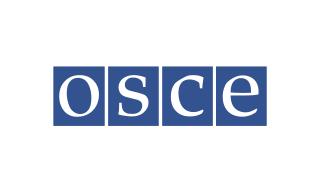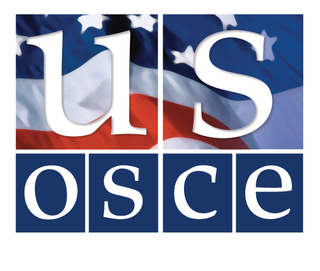Related Research Articles

The Organization for Security and Co-operation in Europe (OSCE) is a regional security-oriented intergovernmental organization comprising member states in Europe, North America, and Asia. Its mandate includes issues such as arms control, the promotion of human rights, freedom of the press, and free and fair elections. It employs around 3,460 people, mostly in its field operations but also in its secretariat in Vienna, Austria, and its institutions. It has observer status at the United Nations.

Human Rights Watch (HRW) is an international non-governmental organization headquartered in New York City that conducts research and advocacy on human rights. The group pressures governments, policymakers, companies, and individual human rights abusers to denounce abuse and respect human rights, and often works on behalf of refugees, children, migrants, and political prisoners.

Helsinki Committees for Human Rights exist in many European countries as volunteer, non-profit organizations devoted to the protection of human rights. It was presumably named after the Helsinki Accords. It was formerly organized into the International Helsinki Federation for Human Rights (IHF), based in Vienna.
The British Helsinki Human Rights Group (BHHRG) was an Oxford-based non-governmental organization which claimed to monitor human rights in the 56 participating States of the Organization for Security and Co-operation in Europe (OSCE). Despite its name, the organisation was not affiliated to the Helsinki Committee for Human Rights. BHHRG was critical of what it characterized as Western interference in imposing democracy, and claimed to support the right of political independence from the west of a number of Communist and post-Communist regimes, as well as of a number of African dictators.

Turkmenistan's human rights record has been heavily criticized by various countries and scholars worldwide. Standards in education and health declined markedly during the rule of President Saparmurat Niyazov.
The International Helsinki Federation for Human Rights (IHF) was a self-governing group of non-governmental organizations that acted to protect human rights throughout Europe, North America and Central Asia. A specific primary goal was to monitor compliance with the human rights provisions of the Helsinki Final Act and its follow-up documents.
Helsinki Watch was a private American non-governmental organization established by Robert L. Bernstein in 1978, designed to monitor the former Soviet Union's compliance with the 1975 Helsinki Accords. Expanding in size and scope, Helsinki Watch began using media coverage to document human-rights violations committed by abusive governments. Since its inception, it produced several other watch committees dedicated to monitoring human rights in other parts of the world. In 1988, Helsinki Watch and its companion watch committees combined to form Human Rights Watch.

The Moscow Helsinki Group was one of Russia's leading human rights organisations. It was originally set up in 1976 to monitor Soviet compliance with the Helsinki Accords and to report to the West on Soviet human rights abuses. It had been forced out of existence in the early 1980s, but was revived in 1989 and continued to operate in Russia.
The Turkmen Helsinki Foundation for Human Rights is a non-governmental organization, based in Bulgaria, for the promotion of human rights in Turkmenistan. The organization was founded on July 21, 2003, in Varna, Bulgaria as a branch of the International Helsinki Federation for Human Rights.
European Roma Information Office (ERIO) is an international advocacy organization for Romani people based in Brussels, established on 18 March 2003 with Angéla Kóczé as the Director, announced on the Balkan Human Rights List by way of the Greek Helsinki Monitor.
The Kharkiv Human Rights Protection Group (KhPG) is one of the oldest and most active Ukrainian human rights organizations. As a legal entity, it was established in 1992, but it has been working as a human rights protection group in the Ukrainian SSR since 1988 under the Society "Memorial". It was the first official human rights organization in the former USSR. Many members of the organization took part in a human rights movement of the 1960s – 1980s.

All-Ukrainian Association of Public Organizations Ukrainian Helsinki Human Rights Union (UHHRU) was founded by 15 public human rights organizations on 1 April 2004. UHHRU is a non-profit and non-partisan organization.

The Ukrainian Helsinki Group was founded on November 9, 1976, as the "Ukrainian Public Group to Promote the Implementation of the Helsinki Accords on Human Rights" to monitor human rights in Ukraine. The group was active until 1981 when all members were jailed.

The United States Mission to the Organization for Security and Cooperation in Europe represents the United States government in the Organization for Security and Cooperation in Europe (OSCE). Currently, Michael R. Carpenter represents the United States at the OSCE and holds the title of ambassador.
International Partnership for Human Rights (IPHR) is an international non-governmental human rights organization with its seat in Brussels, Belgium. It was established in the spring of 2008. It is a non-profit organization.
Security and Human Rights is a magazine that was formerly known as the Helsinki Monitor. It was established in 1990 and obtained its current name in 2008. The journal is published by Martinus Nijhoff Publishers on behalf of the Netherlands Helsinki Committee and is a legacy of the Helsinki Accords, which during the Cold War were intended to provide a bridge between Eastern and Western Europe on the basis of common principles and co-operative security.
The Association of Ukrainian Human Rights Monitors on Law Enforcement is a Ukrainian human rights organization that oversees nationwide monitoring of Ukrainian law enforcement conduct, utilizing its resources to ensure the active preservation of human rights and fundamental freedoms in the Central European country.

The Bulgarian Helsinki Committee is an independent non-governmental organization for human rights founded on July 14, 1992 in Sofia, Bulgaria. Its main objectives are protection and promotion of human rights in Bulgaria. With more than 30 associates, the Bulgarian Helsinki Committee is the largest human rights watchdog in the country.
The Lithuanian Helsinki Group was a dissident organization active in the Lithuanian SSR, one of the republics of the Soviet Union, in 1975–83. Established to monitor the implementation of the Final Act of the Conference on Security and Cooperation in Europe, better known as Helsinki Accords, it was the first human rights organization in Lithuania. The group published over 30 documents that exposed religious repressions, limitations on freedom of movement, political abuse of psychiatry, discrimination of minorities, persecution of human right activists, and other violations of human rights in the Soviet Union. Most of the documents reached the West and were published by other human rights groups. Members of the group were persecuted by the Soviet authorities. Its activities diminished after it lost members due to deaths, emigration, or imprisonment, though it was never formally disbanded. Some of the group's functions were taken over by the Catholic Committee for the Defense of the Rights of Believers, founded by five priests in 1978. Upon his release from prison, Viktoras Petkus reestablished the Lithuanian Helsinki Group in 1988.